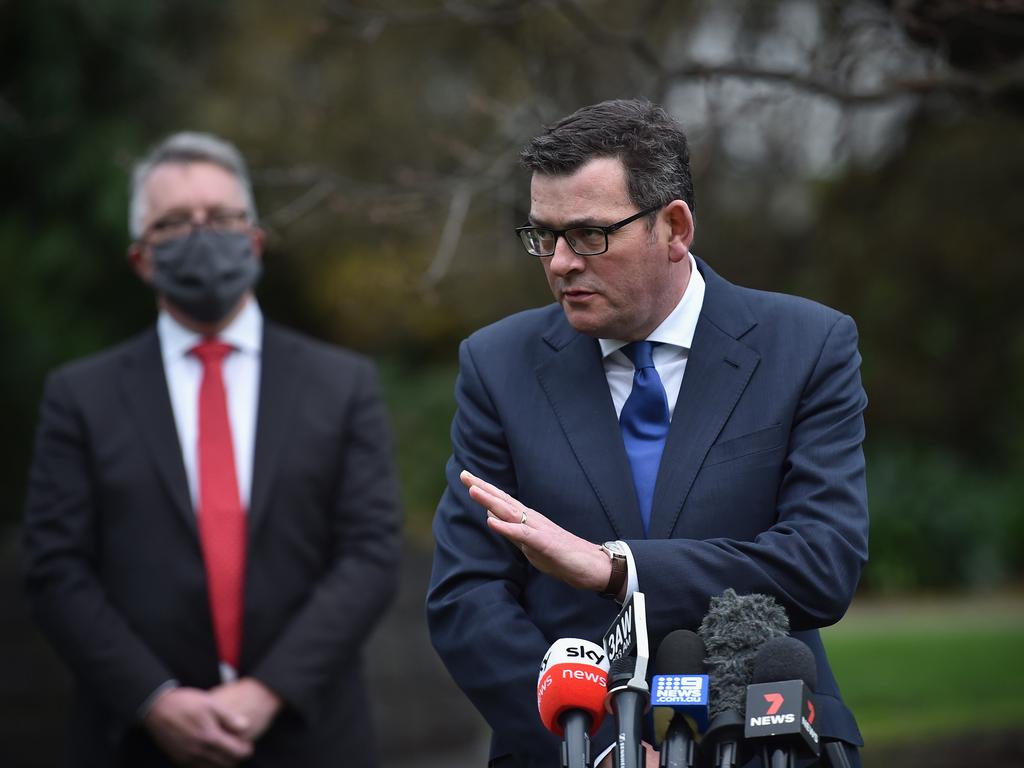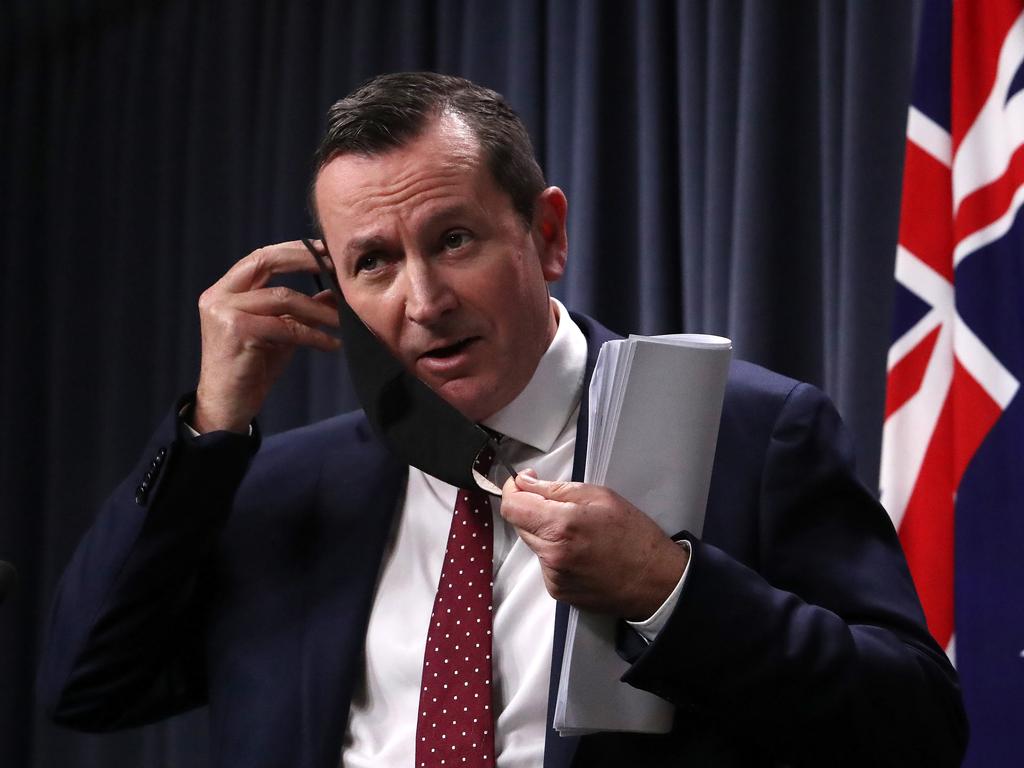Employers grapple with the great Covid vaccination question
Employer groups and unions want consensus on workplace vaccination rules.

Andrew McKellar is sceptical. Just days into his new job as chief executive of the Australian Chamber of Commerce and Industry, the longtime industry lobbyist expresses concern about the Morrison government’s ability to achieve what he calls “very, very ambitious” vaccination targets over the coming months.
“In the national plan, you don’t start to move beyond lockdowns until you get to 80 per cent,” McKellar tells Inquirer. “That’s a very testing threshold. I cannot think of too many other countries in the world that are anywhere near that at the moment. It’s very hard to say (if the targets will be met). I think they are extremely optimistic. I certainly hope so but, honestly, we have to be pushing the envelope more than we are currently.”
Not for the first time, the pandemic has forged a degree of agreement between business and organised labour. On this occasion, it is a shared frustration at the government’s handling of the vaccine rollout.
“I am not convinced that there are parts of the government that want to really make the hard decisions and what’s what they are there for,” McKellar says. “If we are going to hit these targets then we are going to have to move beyond business as usual.”
One of the “hard decisions” McKellar would like the government to make is to grant indemnity to employers who vaccinate employees at the workplace. Scott Morrison has ruled out indemnifying employers but McKellar says “we need to have a discussion about whether or not we need to go beyond just reliance on voluntary approaches”.

SPC’s decision to seek to mandate Covid vaccination of its workforce has triggered national debate about whether employers have the legal power to enforce mandatory vaccination of employees.
In a significant intervention on Friday, the Business Council of Australia and the ACTU went public to jointly oppose individual employers being able to unilaterally impose a mandatory vaccination policy.
“Employers and unions recognise that for a small number of high-risk workplaces there may be a need for all workers in a workplace to be vaccinated to protect community health and safety,” they said. “These are serious decisions that should not be left to individual employers and should only be made following public health advice based on risk and medical evidence.
“The ACTU and the BCA call on governments and the national cabinet to support this position and ensure that where mandatory vaccination requirements are necessary, they are implemented through the use of nationally consistent public health orders.”
ACTU secretary Sally McManus told Inquirer: “We think strongly that these decisions must be made by medical experts. If you are allowing employers, one by one, just to make up what they require people to have to do a job, that’s a very dangerous proposition.”
BCA chief executive Jennifer Westacott says the immediate priority is to address vaccine supply and access points, and mandatory vaccination should be confined to a small number of at-risk categories through uniform state public health orders.
She nominates international travel, quarantine and high-risk workplaces including aged care, meat and food processing as categories potentially subject to the orders.
SPC’s controversial decision highlighted the legal uncertainty around the question of whether employers could insist on compulsory jabs in their workplace.
In an overdue move on Thursday night, the Fair Work Ombudsman released updated guidance on workplace vaccinations, having previously asserted the overwhelming majority of employers would not be able to mandate vaccination.

Without government intervention, for most employers the right to mandate workplace vaccination will turn on whether any direction to be vaccinated is “lawful and reasonable”. Workplace lawyers argue a direction will in most cases be lawful but the key question is whether it is reasonable.
Dividing work into four broad tiers, the FWO guidance says an employer’s direction to employees performing Tier 1 or Tier 2 work – including quarantine, border control, health and aged care – is “more likely to be reasonable” given the increased risk of employees being infected or giving Covid to a vulnerable person.
The guidance describes Tier 3 work as where there is interaction or likely interaction between workers and others such as customers, other employees or the public in the normal course of employment, such as stores providing essential goods and services.
It says when no community transmission of coronavirus has occurred for some time where the employer is located, a direction to employees to be vaccinated was in most cases less likely to be reasonable.
However, “where community transmission of coronavirus is occurring in an area, and an employer was operating a workplace in that area that needs to remain open despite a lockdown, a direction to employees to receive a vaccination is more likely to be reasonable”.
Employer directions to Tier 4 workers, including employees working from home, was unlikely to be reasonable, given the limited risk of Covid transmission.
Michael Byrnes, a partner at law firm Swaab, says the FWO should have issued such detailed guidance some time ago, accusing it of previously adopting a “curiously conservative approach”.
For at least six months, employers have been calling for a nationally co-ordinated uniform approach to rolling out the Covid vaccine across the workforce, declaring most companies will only be prepared to encourage workers to take the jab as they fear legal action from making vaccination a mandatory work requirement.
“It should be remembered the Fair Work Ombudsman does not determine the law – it offers guidance and advice on workplace relations law and can prosecute breaches of the Fair Work Act,” Byrnes tells Inquirer.
“As such, the significance of its views should not be overstated. Those views do not have any legal standing. There is a tendency to conflate or confuse the role of the Fair Work Ombudsman with the Fair Work Commission. It is the Fair Work Commission where the principles relating to mandatory workplace Covid-19 vaccination will likely be determined and applied in the course of litigation.”
Byrnes says for most employers the key question of whether a mandatory vaccination is reasonable “will rarely lend itself to an easy yes or no response”. “Employers looking to the Fair Work Ombudsman for that certainty will be sorely disappointed – because of the complexity of the applicable principles it is not something the Fair Work Ombudsman is able to give,” he says.
Australian Industry Group chief executive Innes Willox says the updated advice gives more clarity for businesses around what they can do and cannot do.
But Australian Mines and Metals Association chief executive Steve Knott says the guidance contains “multiple tiers and pages of caveats and complexities to consider”.
“There is still enormous ambiguity around whether an employer will be backed by the law if making Covid-19 vaccinations an inherent requirement for work,” Knott tells Inquirer.
“It’s also unhelpful the FWO implication that only businesses with higher exposure to Covid risks may be able to lawfully direct employees to be vaccinated.
“It is patently absurd to suggest a business can only take preventive action against the risks of Covid-19 in the workplace when that risk is imminent and knocking down the door.
“You don’t wait to install a safety rail on a high-rise balcony until someone is teetering on the edge. You foresee the risk and mitigate it well before it eventuates.”
Knott says there is a developing conflict between an employer’s overarching duty to provide a safe workplace and the “minefield” of employment law considerations that might apply if an employer takes a position of mandating vaccinations.
“Complexities include WHS, anti-discrimination, privacy and IR laws such as ‘major change’ consultation clauses in enterprise agreements or award terms. Other scenarios include where certain employees cannot be vaccinated for health reasons or where groups of employees refuse to work alongside an unvaccinated colleague,” he says.
“We need national leadership from our federal legislators, not more advice and ‘guidance’ from administrative bodies.”
Restaurant and Catering Australia chief executive Wes Lambert says there needs to be a “national consensus” about the rules for employers wanting to pursue mandatory vaccination of employees. Like McKellar, Lambert says if the Morrison government is not going to mandate vaccinations it should indemnify businesses that want to make vaccination mandatory in the same way GPs and vaccination clinics are indemnified. “If they don’t make it mandatory, OK, we understand that. However, they need to remove the legal fear from businesses that do so.”
McManus says public debate about vaccine reluctance and mandatory jabs are part of “monumental buck shifting” by the government to distract attention from the lack of progress in the vaccine rollout. “Morrison is trying to make everyone else’s problem except for the government’s.”
“Where you go about issuing punitive mandates, it actually solidifies people’s suspicion and resistance. At the moment, the biggest barrier is the fact that people can’t get the vaccination. Workers are extremely frustrated that it’s so difficult to get the vaccine. At the same time, they feel as though they are being shouted at and blamed for not getting it.”







To join the conversation, please log in. Don't have an account? Register
Join the conversation, you are commenting as Logout